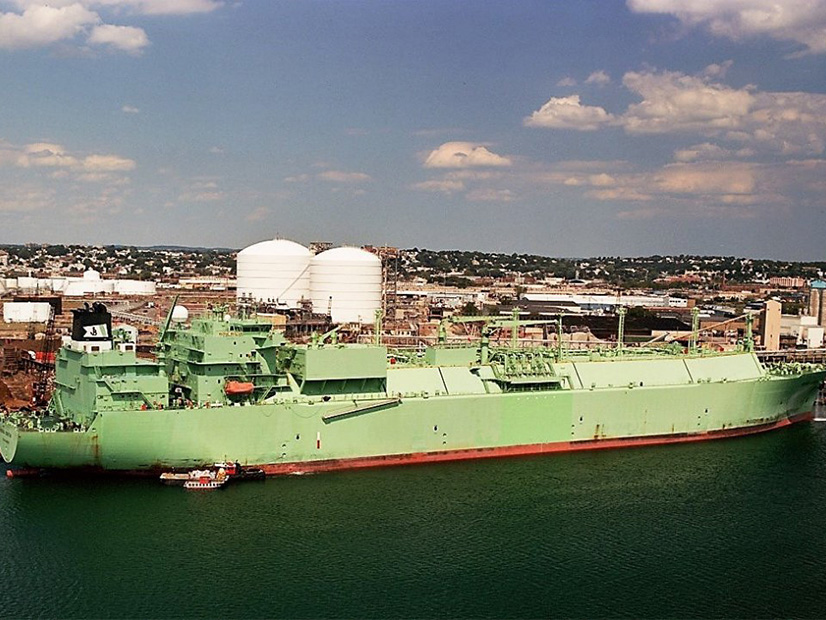The retirement of the Everett LNG import terminal could jeopardize the reliability and affordability of the region’s electric and gas networks, FERC Chair Willie Phillips and NERC CEO James Robb wrote in joint comments issued Monday.
Based on the evidence presented to FERC at the New England Winter Gas-Electric Forum in June, Phillips and Robb said they have “serious concerns about certain local gas distribution systems’ ability to ensure reliability and affordability in the region without Everett.”
“As discussions regarding the future of Everett continue, we encourage all parties to keep reliability and affordability at the center of those negotiations,” they added.
Phillips and Robb highlighted the fallout from Winter Storm Elliott in December 2022, noting that reduced flows of gas, combined with requests from shippers for increased gas volumes, caused pipeline pressures to plummet. (See Déjà Vu as FERC, NERC Issue Recommendations over Holiday Outages.)
“That dynamic put significant stress on the natural gas system, which only narrowly avoided significant outages,” Phillips and Robb wrote. The officials referenced emergency LNG injections made by Consolidated Edison that saved its system from collapse, noting that “it would have taken ‘many months’ to restore service, leaving hundreds of thousands of natural gas customers without heat in the middle of winter.”
Speaking at the New England-Canada Business Council (NECBC) Executive Energy Conference on Nov. 1, Robb said the Northeast “dodged a major bullet last winter during Elliott.”
“Had the temperature not warmed up on Christmas Day, Con Ed and National Grid likely would have been interrupting gas customers because the pipelines were losing pressure,” Robb added. “The restoration of a major natural gas system like the one serving New York City — we would likely still be in the process of lighting pilot lights.”
Regarding the electric system, recent studies from ISO-NE projected out through 2032 have indicated Everett may not significantly increase the reliability of the grid under extreme winter weather conditions. Despite these findings, RTO officials have indicated it would be wise to retain the facility to hedge against uncertainty in the future energy mix. (See NE Stakeholders Debate Future of Everett at FERC Winter Gas-Elec Forum.)
Phillips and Robb echoed these concerns about uncertainty, noting that if ISO-NE’s assumptions regarding load growth, new resources and transmission, and retirements prove to be wrong, “ensuring reliability and affordability could become challenging in the face of a significant winter event.”
They said ISO-NE and stakeholders should pursue reforms to incentivize generators to procure the necessary fuel to keep the grid running during extreme storm events.
“To the extent that Everett or other infrastructure plays a role in supporting electric reliability by making needed energy supplies available, in the near term or the future, such reforms should consider how to ensure that any needed reliability contributions are appropriately valued,” Phillips and Robb wrote.
ISO-NE declined to comment on the joint statement.
The Mystic Agreement — through which New England ratepayers cover the costs of Everett’s main customer, the Mystic Generating Station — is set to expire after this winter, coinciding with the retirement of the plant. Negotiations between Constellation (which owns both Everett and Mystic) and the local gas distribution utilities to keep Everett open have yet to produce an agreement.
Speaking at the June forum, Carrie Allen of Constellation told FERC that “the future of the facility is not ensured” and that “we’re just running out of time.” Allen added that even if an agreement is reached to keep Everett open, there still likely would be a nine-month regulatory process.
“There is no hard-and-fast drop-dead date,” Allen said, adding that “normally, I think we would have the supply procured at this point.”
New Hampshire Consumer Advocate Donald Kreis, who has been a vocal opponent of propping up Everett through electric rates, called the statement from Phillips and Robb “disappointing and a bit puzzling.”
While Everett may be needed for Massachusetts gas distribution companies, Kreis told RTO Insider, ISO-NE studies show the facility is not necessary for grid reliability and therefore its costs should not be charged to the region’s electric ratepayers.
He called Phillips’ and Robb’s comments “potentially an unhelpful scare tactic” that could “cause people to feel a sense of alarm without any basis for doing so.”




